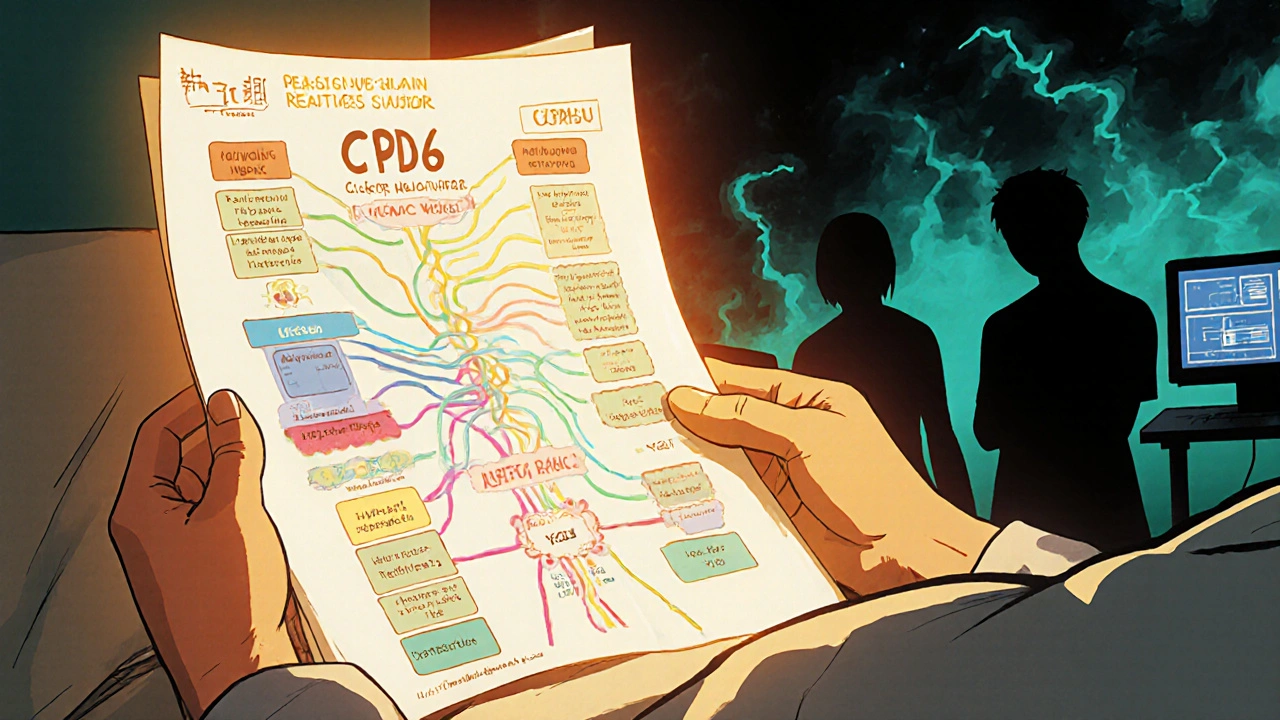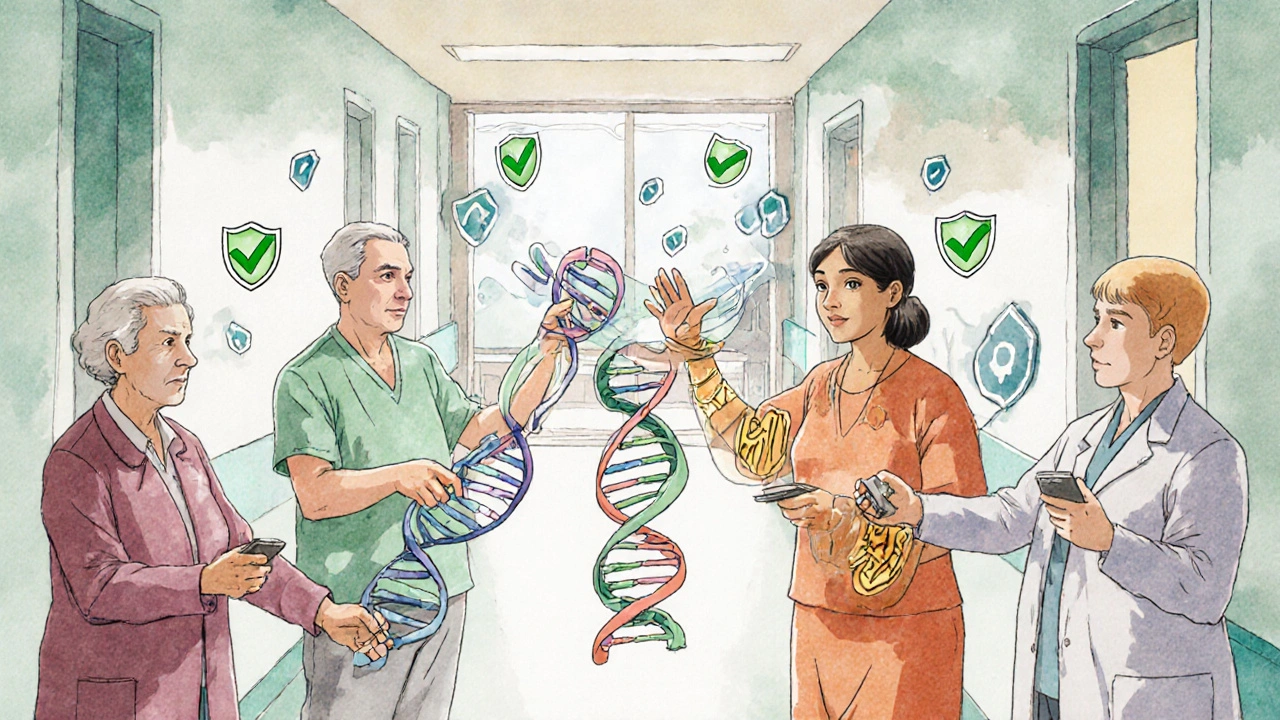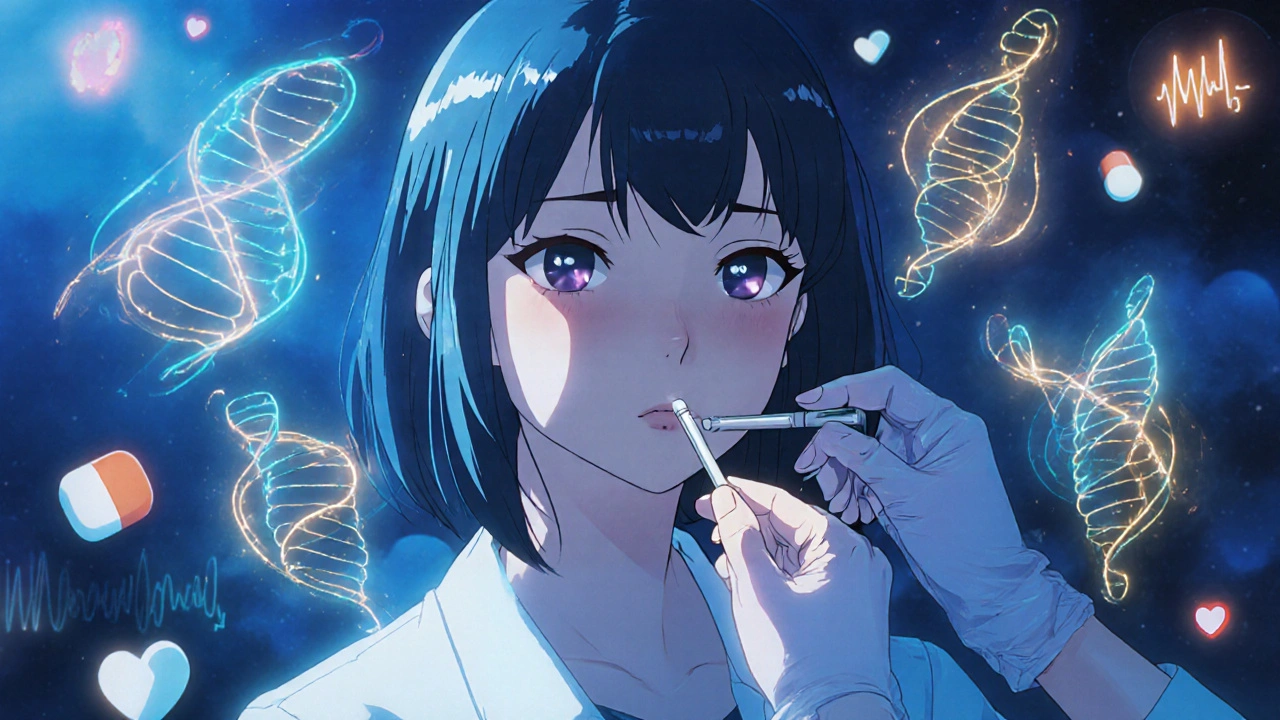Medication Safety Predictor
How Your Genes Affect Medications
This tool helps you understand how your genetic profile might impact how your body processes common medications. Based on your selection below, we'll show potential risk levels for side effects.
What if you could avoid a dangerous side effect before it happens? What if your next prescription didn’t come with a gamble - one that could land you in the hospital instead of helping you feel better? That’s the promise of pharmacogenetic testing: using your DNA to figure out how your body will handle certain medications.
It’s not science fiction. Every year, millions of people in the U.S. and Australia experience bad reactions to drugs they were prescribed. Some get dizzy. Others get rashes. A few end up in the ICU because their body couldn’t break down the medicine properly. And in many cases, the root cause isn’t the doctor’s mistake - it’s your genes.
How Your Genes Control Your Medications
Your body doesn’t treat every drug the same way. That’s because of enzymes - proteins that break down medications so they can be used or removed. One family of these enzymes, called cytochrome P450, does the heavy lifting for about 80% of commonly prescribed drugs. And your genes decide whether you’re a slow, normal, or fast breaker-down of these drugs.
Take CYP2D6. This single gene affects how your body handles 25% of all prescription medications - including antidepressants like sertraline, painkillers like codeine, and even some heart drugs. If you have two slow versions of this gene, you’re a poor metabolizer. That means codeine won’t turn into its active form, and you’ll get no pain relief. Or worse - you might get a dangerous buildup of the drug in your system.
On the other hand, if you’re an ultrarapid metabolizer, your body turns codeine into its active form too fast. That can lead to an overdose, even at normal doses. There are documented cases of children dying after routine tonsillectomies because they were given codeine and their bodies turned it into morphine too quickly. That’s not rare. It’s genetic.
When Testing Makes a Real Difference
Not every drug needs genetic testing. But for some, skipping it is like driving blindfolded.
Take warfarin, a blood thinner. Getting the dose wrong can cause a stroke or a dangerous bleed. For decades, doctors used trial and error - start low, wait weeks, adjust, repeat. Now, testing for genes like CYP2C9 and VKORC1 can predict the right starting dose within days. Studies show this cuts hospitalizations from bleeding or clots by up to 30%.
Another powerful example: abacavir, an HIV drug. Before testing, about 5-8% of patients had a life-threatening allergic reaction. Now, before prescribing it, doctors test for the HLA-B*57:01 gene variant. If you have it, you don’t get the drug. Period. That one test dropped the reaction rate to nearly zero. It’s one of the few cases in medicine where a genetic test doesn’t just help - it prevents death.
In cancer treatment, testing for DPYD before giving 5-fluorouracil can save lives. People with certain variants can’t process the drug at all. Without testing, they can suffer severe toxicity - vomiting, diarrhea, even death. With testing, doctors simply lower the dose or switch drugs. One woman in Adelaide, diagnosed with colon cancer, avoided a 3-week ICU stay because her test showed she was a poor metabolizer. Her oncologist changed her regimen before she even started treatment.
What You’ll Actually Get Tested For
Most commercial tests look at 5-10 key genes. Here are the most important ones and what they affect:
- CYP2D6: Antidepressants, opioids, beta-blockers, antipsychotics
- CYP2C19: Clopidogrel (Plavix), proton pump inhibitors (like omeprazole), some antidepressants
- DPYD: 5-fluorouracil and capecitabine (chemotherapy drugs)
- SLCO1B1: Statins (like simvastatin). If you have a bad variant, you’re 4.5 times more likely to get muscle damage
- HLA-B*57:01: Abacavir (HIV drug)
These five genes cover the most common and dangerous drug-gene interactions. You won’t get tested for every possible interaction - only the ones with proven clinical impact. The FDA lists over 300 drug-gene pairs, but only about 20 have strong enough evidence to be routinely tested.
What the Results Actually Mean
Don’t expect a simple yes or no. Results come back as metabolic phenotypes:
- Poor metabolizer: Your body barely breaks down the drug. Risk of toxicity.
- Intermediate metabolizer: Slower than average. May need lower doses.
- Normal metabolizer: Your body handles the drug as expected.
- Rapid metabolizer: Breaks it down faster than normal. May need higher doses.
- Ultrarapid metabolizer: Breaks it down so fast the drug doesn’t work - or becomes dangerous.
Here’s the catch: being a poor metabolizer for one drug doesn’t mean you’ll be one for all. You might be a poor metabolizer for CYP2D6 but a normal one for CYP2C19. That’s why testing multiple genes matters.
And not every result changes your treatment. Sometimes, your doctor will say, “We’ll watch you closely,” instead of switching drugs. That’s not a failure - it’s context. Genetics is one piece of the puzzle. Age, liver function, other meds, and your health history all matter too.

Who Benefits Most?
This isn’t for everyone. But if you fit any of these profiles, testing could be life-changing:
- You’ve had a bad reaction to a medication before - even if it was mild
- You’re on multiple prescriptions (polypharmacy), especially for mental health, heart disease, or cancer
- Your current meds aren’t working, and your doctor doesn’t know why
- You’re starting a new drug with a known gene interaction (like clopidogrel or statins)
- You’re in a special population - older adults, Indigenous Australians, or people of African or Asian descent, where certain gene variants are more common
For example, about 20% of people of East Asian descent carry a variant in CYP2C19 that makes clopidogrel ineffective. That’s a major problem if you’ve had a heart attack and need that drug to prevent another. Without testing, you might think you’re protected - when you’re not.
The Real Costs - Money and Time
Testing usually costs between $250 and $500 out of pocket. Some private insurers in Australia cover it if your doctor says it’s medically necessary - especially for psychiatric meds or cancer drugs. Medicare doesn’t cover it broadly yet. That’s changing, but slowly.
Getting tested is simple. A cheek swab takes 30 seconds. You mail it to a lab. Results come back in 1-2 weeks. Your doctor gets a report that says things like: “Patient is a poor CYP2D6 metabolizer. Avoid codeine, tramadol, and paroxetine. Consider alternatives.”
But here’s the problem: not all doctors know how to use the results. A 2021 study found only 35% of GPs felt confident interpreting pharmacogenetic reports. If your doctor doesn’t understand the results, you’re paying for data that doesn’t change your care.
That’s why some people go to specialty pharmacies or genetic counselors. They’ll explain your results, suggest alternatives, and even call your doctor to make sure the prescription changes.
The Limits - Why It’s Not a Magic Bullet
Let’s be clear: this isn’t a crystal ball. Genetics doesn’t tell you everything.
For example, tamoxifen - a breast cancer drug - was once thought to need CYP2D6 testing. But newer studies show the link isn’t strong enough to change treatment. The same goes for some antidepressants. A 2022 JAMA study found that while pharmacogenetic testing reduced bad prescriptions by 30%, it didn’t significantly improve depression symptoms after 24 weeks.
Also, about 1 in 5 tests show a variant with unclear meaning - a “variant of uncertain significance.” That means your lab doesn’t know if it matters. It’s not a red flag - it’s a pause. Your doctor might just stick with the usual approach.
And even if you have a high-risk gene, you might still tolerate the drug fine. Genetics gives probabilities, not certainties. Some people with the worst variants never have side effects. Others without them do. That’s why testing guides decisions - it doesn’t replace clinical judgment.

Should You Get Tested?
Here’s a simple rule: if you’ve ever had a drug that made you sick, or if you’re starting a drug with a known gene interaction, get tested.
If you’re on three or more medications - especially if one is for depression, anxiety, heart disease, or cancer - testing could prevent a bad outcome.
If you’re healthy, on one medication, and doing fine? Maybe wait. The benefit is smaller. But if you’re planning to start something new - like a statin, antidepressant, or painkiller - why not know your risk before you start?
It’s not about being perfect. It’s about reducing risk. Just like you get your blood pressure checked, or your cholesterol tested, why not know how your body handles drugs?
There’s no downside to knowing. The worst that happens is you learn you’re a normal metabolizer - and you can stop worrying. The best? You avoid a hospital stay, a dangerous reaction, or a medication that never worked for you - all because you knew your genes.
It’s not about replacing your doctor. It’s about giving them better tools. And if you’re the one taking the pill, it’s about taking control - one gene at a time.
Frequently Asked Questions
Is pharmacogenetic testing covered by Medicare in Australia?
No, Medicare doesn’t currently cover pharmacogenetic testing for general use. However, some private health insurers may cover it if your doctor provides a medical justification - especially for psychiatric medications, cancer drugs, or heart conditions like needing clopidogrel. Always ask your provider before ordering the test.
Can I get tested without a doctor’s order?
Yes, direct-to-consumer tests are available online, but they’re not always reliable. Many don’t include clinical interpretation, and some test genes that aren’t medically useful. A test ordered through a doctor comes with a report designed for clinical use and access to a pharmacist or genetic counselor who can explain what the results mean for your treatment.
How long do results take?
Typically 7 to 14 days. Some labs offer faster turnaround (3-5 days) for urgent cases like cancer treatment planning. The sample is usually a simple cheek swab - no blood draw needed.
Will my insurance company use my results to deny coverage?
No. In Australia, genetic discrimination in health insurance is prohibited under the Genetic Discrimination Act 2022. Insurers cannot ask for or use your pharmacogenetic test results to deny coverage, increase premiums, or cancel policies. This protection also applies to life insurance.
Do I need to get tested more than once?
No. Your genes don’t change. Once you’ve been tested, the results are valid for life. You can use them for any future prescriptions. Keep a copy in your personal health records and share it with any new doctor.
Next Steps
If you think testing might help you:
- Write down any past medication reactions - even if they seemed minor
- Ask your doctor if any of your current or planned meds have known gene interactions
- Request a referral to a pharmacist with pharmacogenetics training or a genetic counselor
- Ask if your private health insurance covers the test under your extras cover
- If approved, get the test done and bring the results to your next appointment
Don’t wait for a bad reaction to happen. Knowledge isn’t just power - in medicine, it’s safety.



19 Comments
Alexander Levin
November 27, 2025 AT 18:35This is just Big Pharma’s way to make us pay more. 🤡 Next they’ll charge us per gene.
Ady Young
November 29, 2025 AT 08:59I got tested last year after my dad had a bad reaction to statins. Turns out I’m a slow metabolizer for SLCO1B1. My doc switched me to pravastatin and I haven’t had a single muscle ache since. Best $300 I ever spent.
Travis Freeman
November 30, 2025 AT 16:11This is so cool. Imagine if we all had this info built into our medical records from birth. No more guessing games with meds. I wish this was standard like vaccines. We’re basically flying blind without it.
Sean Slevin
December 2, 2025 AT 09:41Wait, wait, wait... So you're telling me my body has a built-in pharmacological profile... like a fingerprint... but for drugs?!?! That's... that's... actually kind of beautiful. I mean, we're talking about molecular destiny here. My genes are the original form of personalized medicine. And yet, we're still stuck in the 1950s with 'one-size-fits-all' prescriptions. It's like using a typewriter in the age of AI. Why? Why are we so slow?!?!
Chris Taylor
December 4, 2025 AT 02:11My mom took antidepressants for 10 years and none worked until she got tested. Turns out she’s a poor CYP2D6 metabolizer. Switched to escitalopram and boom - she’s actually happy again. It’s wild how long it took just because no one thought to check her genes.
Melissa Michaels
December 4, 2025 AT 08:39Pharmacogenetic testing is clinically validated for several high-risk drug-gene interactions including HLA-B*57:01 and abacavir, DPYD and fluoropyrimidines, and CYP2C19 and clopidogrel. These are not theoretical risks. They are evidence-based interventions that reduce morbidity and mortality. Clinicians should be educated on their implementation.
Nathan Brown
December 6, 2025 AT 03:18I used to think this was overhyped... until I got my results. Turns out I’m an ultrarapid CYP2D6 metabolizer. I took tramadol for a sprained ankle and almost passed out. No one warned me. Now I avoid anything with codeine or oxycodone. I wish I’d known this before I wasted years on meds that did nothing.
Matthew Stanford
December 6, 2025 AT 21:14This isn’t just about medicine - it’s about dignity. No one should suffer because their body doesn’t fit the average. We all deserve to be treated as individuals, not lab samples. If we can map the human genome, why are we still guessing what pills to give people?
Olivia Currie
December 7, 2025 AT 18:20OMG I JUST GOT MY RESULTS AND I’M A POOR METABOLIZER FOR CYP2C19 😭 I’VE BEEN ON PLAVIX FOR 3 YEARS AND DIDN’T KNOW IT WASN’T WORKING?!?! THIS CHANGES EVERYTHING. I’M CRYING RIGHT NOW. THANK YOU FOR THIS POST!!!
Curtis Ryan
December 8, 2025 AT 05:47I got tested after my friend had a bad reaction to chemo. Best thing I ever did. Now I know not to touch statins. I also know why my grandpa died at 68 from a heart attack - he was on a drug his body couldn’t handle. This stuff matters.
Rajiv Vyas
December 8, 2025 AT 13:38They’re just using genes to sell more tests. Next they’ll say your blood type determines if you can drink coffee. This is all corporate magic. I don’t trust labs. I trust my gut.
farhiya jama
December 8, 2025 AT 19:03I got tested. Turned out I’m fine. So now I have to pay $400 to find out I’m normal? That’s just scamming people who are anxious about meds. I’m done.
Astro Service
December 10, 2025 AT 18:53America leads the world in this stuff. Other countries are still stuck in the dark ages. If you’re not getting tested, you’re not serious about your health. Period.
DENIS GOLD
December 11, 2025 AT 16:22So what? You pay $500 to find out you’re not a superhero? Cool. Meanwhile, my cousin took aspirin for 40 years and lived to 92. Genetics? Nah. Luck and a good diet.
Ifeoma Ezeokoli
December 13, 2025 AT 12:57In Nigeria, we don’t even have access to most of these drugs, let alone testing. But I still think it’s beautiful that someone, somewhere, can avoid pain because science listened to their DNA. That’s hope.
Daniel Rod
December 14, 2025 AT 13:28I’m an ultrarapid metabolizer for CYP2D6. Took me 7 years to figure out why antidepressants never worked. Now I know why I needed double the dose. And why I got dizzy on codeine. It’s not me - it’s my genes. I feel less broken now.
gina rodriguez
December 15, 2025 AT 03:56My doctor didn’t know what to do with my results. I had to print the report, highlight the key parts, and bring it back. But he changed my statin after that. So yes, it works - if you’re willing to fight for it.
Sue Barnes
December 15, 2025 AT 22:43If you’re not getting tested, you’re just gambling with your life. Stop being lazy. Your genes don’t care how busy you are.
jobin joshua
December 16, 2025 AT 16:27I got tested after my kid had a bad reaction to ibuprofen. Turned out he’s a slow CYP2C9 metabolizer. Now we avoid NSAIDs. My wife cried when she read the report. We almost lost him. This isn’t science fiction - it’s survival. 🙏